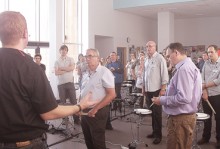To quote the last Labour Secretary of State for Education, “We live in an X-Factor Generation”. I think we would all agree we should add, “Britain’s Got Talent”, “The Voice UK” not forgetting the success of popular games like “Guitar Hero” and “Rock Band”. Whether we agree with the format or actually watch the shows or play the games, music is popular, very popular. So why aren’t our classrooms full of young musicians?
What causes the drop off in engagement as students’ progress through education, specifically the uptake of music from year 9 onwards? There are many factors to consider with this particular prob- lem, but as we travel across the UK the message seems very clear. Students and most tutors I spoke to are looking for something relevant and flexible. Professional music offers such a variation in job roles, musician, producer, sound man, instrument technician or even roadie to name but a few. One size does not fit all, so where do we look for a qualification that gives all the best opportunity to suc- ceed?
Chris Ward is Acting Head of Music at George Greens’ School in London. He expressed to me a de- sire heard from many schools I visited, ‘’our students had expressed a desire to explore a specialism rather than continue with such a broad musical spectrum in year 10 and 11.’’ The music team at George Greens’ found the route to their solution at a GCSE standardisation meeting. Chris told me ‘’we discovered a school with similar demographics to our own who was delivering ‘Rockschools – Music Practitioner’ vocational qualifications. After a visit to that school it confirmed that the course would suit us as well, given that many of our students were more interested in a course that leans toward contemporary music rather than genres of music that they would not necessarily listen to’’
So what is ‘Music Practitioner’ and how does it benefit our students and our schools?
‘Music Practitioner’ qualifications are for Learners who want to develop their skills in the core ele- ments of the Music Industry. These fully accredited qualifications are a real alternative for Learners who aren’t inspired by GCSE, A-Level and BTEC options. They are unique in that they offer clear pathways for students in four specialisms, performance, technology, composition and business.
Once students have selected their pathway, they currently select one core unit from their specialism selecting from a further eighty five units of work at Level 3, thirty three units at Level 2 and twenty two units at Level 1 to make up their required credits. I was enthused to see options including ‘Getting Work in Music’, ‘Composing Music’ (Solo or Collaboration), ‘Live Music Performance’ and ‘Studio Sound Mixing’ within the core unit options.
The qualifications are developed with ‘Access to Music’ and other industry professionals, so that they are relevant to the current dynamics of the Music Industry. This enables Rockschool to regularly re- new units, taking into account recent trends with professionals working in the industry. In theory, this helps all units of study offered to stay relevant to the music industry.
Performance Points which contribute to National Achievement Tables are currently awarded at 12 of the 14 levels available. UCAS points are currently awarded on the final 5 levels of qualification.
Here, it seems, is a qualification that could allow our students to start to shape their own future in mu- sic, whilst enabling schools and colleges to be rewarded for their students’ achievements.
Ellen Evans, Head of Music at Ysgol Bryngwyn School in Llanelli, Carmarthenshire, found ‘Music Practitioner’ while looking for a level 2 course that offered a pathway in technology. She told me, ‘’I was so impressed with the content that I consulted with senior management, parents and pupils to see if the students who had initially selected GCSE, may be interested in transferring to ‘Music Practi- tioner’. The response was universally positive, largely I believe because the units better suited their interests and future career intentions.’’
Ellen and all at Ysgol Bryngwyn are now approaching the end of their first year using the new qualifi- cations. Last time we spoke, Ellen told me, ‘’Pupils have really enjoyed having some choice over the units that they could study. With our support, this has allowed them to select units which better reflect
their personal needs and aspirations. They have most certainly benefited greatly from considering the bigger picture through units such as ‘Live Performance’, where pupils have to plan and put on a 15 minute set. The unit also covers aspects such as the creation of programme notes, risk assessments, booking a venue, equipment and personnel rather than just what they were going to perform!’’
I heard similar stories from sites all across the UK; students seem to have clear goals and ambition but disengage when they are forced down paths that do not feel appropriate or relevant. At Ysgol Bryngwyn School, due to the clear pathways available with ‘Music Practitioner’, students feel in con- trol of their learning and so take true ownership of their units and overall course direction.
Now my apologies for sounding cynical but so far this sounds all too perfect, where are the weak points? I spoke to Jon Reeves, Director of Music at Steyning Grammar School to see if I could find some. Jon told me ‘’As long as there are local progression routes with this style of learning into post 16 work, then no negatives. It can be a juggling act trying to deliver GCSE at the same time as Music Practitioner, although due to the unit based nature of Music Practitioner, you can target curriculum time to support these students during controlled assessment time etc. Initially we found it difficult to assess work due to lack of exemplar material from the exam board, although as centres deliver the course you build up centre exemplar – however, for us this was solved by linking with a local ‘Access to Music’ provider in Brighton who were hugely supportive and marked work with us for the first time through the qualification – indeed, due to small nature of school’s delivering the qualification, we found we quickly built a strong network for support from others using the qualification and were helped to make these links’’
Jon raises a valid concern in exemplar work and the lack of schools delivering the qualification. With- out similar local schools to compare notes and share best practice, how robust was the support struc- ture offered by Rockschool and its Vocational Qualifications Manager Patrick Healy? I asked Jon the question, ‘’Support is swift, and the visit early on from them to work with students in our first year at my previous school was hugely beneficial. There is also a network of centres that run ‘Access to Mu- sic’ courses post 16, and we have had a lot of support from our local provider in assessing work, and in best models for delivery, as well as being invited to participate in workshops and performance events through this link. Because Rockschool is a smaller exam board, the level of support given feels stronger. There is also a desire to celebrate achievements in the fullest sense in the way the qualifica- tion is set up and this is very liberating for vulnerable students in terms of engaging them and giving them opportunities for positive outcomes.’’
A further concern arises in the challenges faced when getting the qualification approved by school management and gaining approval as an exam centre. I was informed by Rockschool the process is straight forward for any sites who are already set up to deliver BTEC or GCSE, but how does it really feel?
Ellen Evans set up as an exam centre in the last 18 months, she told me, ‘’Gaining approval to offer the course was straightforward and the units are flexible to enable you to offer a curriculum that suits your facilities and resources. From an organisation perspective, in future I will be providing pupils with a course handbook that sets out deadlines from the outset with all the information pupils need on the units available to them and what tasks they have to complete. Rockschool have been helpful in answering queries in relation to moderating work so that I am confident that we are meeting standards and I am looking forward to this qualification becoming as well-known as their instrumental grades.’’
Jon Reeves not only delivers ‘Music Practitioner’ at his current school, but he also delivered it for 3 years at his previous school, Longhill High School. Jon told me, ‘’Gaining management approval was relatively easy once the logistics of how to run within our department were worked through, and the philosophy of ‘why’ was secure to department and management within school.’’
After thorough investigation it seems clear to me, in terms of meeting the needs of all students, and for offering a range of routes for students within and after school provision, Rockschools Music Practi- tioner Qualifications are invaluable. Also their continued place in the national exam performance ta- bles is reassuring and helps considerably in getting the support from school management to run the qualification.
In some quarters reticence to give students the choice is evident. This is most definitely a difficult challenge to approach, but one that we must. As we have discovered, one qualification does not fit all our students aspirations, it never has. We all know how music can enrich the lives of those who make it, whether it is as an amateur or professional. We must no longer close the door on potential stu- dents; we must embrace them and offer pathways to suit their ambition. I have met many potential students on my travels who have told me, ‘’I only wish I had that opportunity when I was at school’’. The skills learnt when making music shape our lives and give us all self-esteem.
We are in the midst of a time of great change in music education, whilst there are many challenges in that process, there are just as many opportunities. Music Practitioner, I believe, is one of those oppor- tunities. Follow Ellen’s lead, consult your parents and pupils and I suspect your schools outcomes will be similar to that of Ysgol Bryngwyn School. I shall leave you with Ellen’s words, ‘’ Music Practitioner is a great course that reflects the world we live in today and the career opportunities available. It helps me equip pupils with the real skills they will need to become valued members of this ever thriving and important industry.’’








